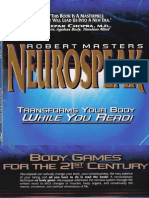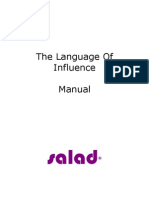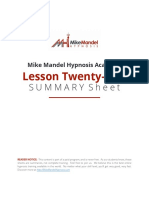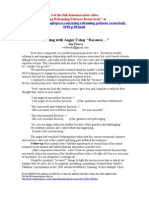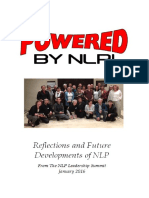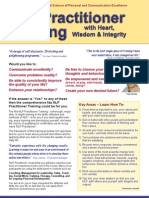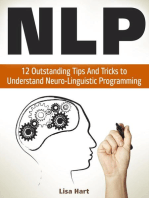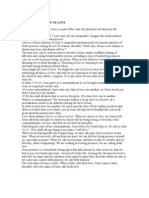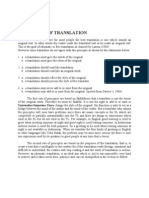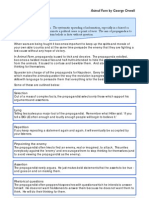The Coaching Language Magic Mini Ebook
The Coaching Language Magic Mini Ebook
Uploaded by
ZedecuxCopyright:
Available Formats
The Coaching Language Magic Mini Ebook
The Coaching Language Magic Mini Ebook
Uploaded by
ZedecuxOriginal Title
Copyright
Available Formats
Share this document
Did you find this document useful?
Is this content inappropriate?
Copyright:
Available Formats
The Coaching Language Magic Mini Ebook
The Coaching Language Magic Mini Ebook
Uploaded by
ZedecuxCopyright:
Available Formats
The Coaching Language Magic Mini E-book – By Jamie Smart
The Coaching Language Magic
Mini E-book
By Jamie Smart
Limits of Liability / Disclaimer of Warranty:
The author and publisher of this book and the accompanying materials have used
their best efforts in preparing this program. The author and publisher make no
representation or warranties with respect to the accuracy, applicability, fitness, or
completeness of the contents of this program. They disclaim any warranties
(expressed or implied), merchantability, or fitness for any purpose. The author
and publisher shall not be held liable for any loss or other damages, including but
not limited to incidental, consequential, or other damages. The author and
publisher make no claims for any medical benefits of this program. The advice of
a competent medical professional should always be sought in the case of health
matters. Copyright in this document belong to the author. The author also
asserts the right to be identified as such and to object to any misuse.
© Salad 2006 www.saladltd.co.uk
The Coaching Language Magic Mini E-book – By Jamie Smart
Table of Contents
Coaching Language Magic Part 1................................................ 3
Coaching Language Magic Part 2................................................ 5
Coaching Language Magic Part 3................................................ 7
Coaching Language Magic Part 4................................................ 9
More Information................................................................... 11
Free Stuff..............................................................................13
About the Author....................................................................14
Acknowledgements.................................................................14
© Salad 2006 www.saladltd.co.uk
The Coaching Language Magic Mini E-book – By Jamie Smart
Coaching Language Magic Part 1
I recently came across one of my favourite hypnosis books, Monsters and
Magical Sticks, by Terry Steele and Steven Heller. The introduction is by
Robert Anton Wilson, and in it he tells the story of the ‘bata scoir’.
The bata scoir is the name of a stick which used to sit in the corner of
Irish classrooms in the early days of British rule. Its purpose was this:
whenever a child spoke in Irish (rather than English), they would be
beaten with the bata scoir. Within a few generations, the number of Irish
speakers fell from 100% (circa 1800) to 5% (circa 1900).
The British knew something very powerful: that a great deal of a people’s
culture and heritage are ‘contained’ within their language. Install a new
language, and its associated culture will soon follow (just as the old one
will diminish as the old language is destroyed).
In the world of computer programming, there are things you can do using
one programming language that you cannot do using another. The
programming language (combined with the imagination and skill of the
programmer) defines the domain of what actions are possible.
Ever since I was a little child, I’ve loved language. And while I didn’t
imagine that language would become such a large part of my life as it
does today, I always had an affinity for words. I love the way they look,
the way they sound, and the amazing things you can do with them.
What I didn’t realize until much more recently is that words shape our
reality; to a great extent, the language we use programs the reality we
experience (see Quantum Psychology by Robert Anton Wilson for a
fascinating, in-depth and reality-stretching exploration of this topic).
The Map Is Not The Territory
One of the presuppositions of NLP is that the map is not the territory. As
human beings, we don’t experience the world directly, but rather through
the maps and models of reality that we have created in our nervous
systems. This is why the ‘L’ in NLP is so powerful and important. The
language a person uses is a reflection of their maps and models of reality,
and reveals aspects of those maps and models which the person
themselves is not aware of. When their models change, their experience
of reality changes. Language is a lever for changing those models, and
thus changing a person’s reality. Please read that again:
The language a person uses is a reflection of their maps and models of
reality, and reveals aspects of those maps and models which the person
themselves is not aware of. When their models change, their experience
of reality changes. Language is a lever for changing those models, and
thus changing a person’s reality.
You can use language to change your (or someone else’s) reality.
© Salad 2006 www.saladltd.co.uk
The Coaching Language Magic Mini E-book – By Jamie Smart
This fact makes language one of the most powerful tools for coaching
yourself and others. The full NLP linguistic set is often undertaught, and
yet is one of the most powerful toolsets there is for making change
possible (I’ve heard Richard Bandler say that the NLP linguistic tool ‘The
Meta Model’ is the starting point for everything he’s discovered in the field
of NLP).
Time for an exercise:
1) Think of something you want (Eg. I want a new car / a new job / to
learn French etc). Say it out loud, and notice how you feel. Then
say it in the following ways, paying attention to your internal
experience each time:
- I should… (Eg. I should get a new car)
- I ought to… (Eg. I ought to get a new car)
- I’ve got to… (Eg. I’ve got to get a new car)
- I have to… (Eg. I have to get a new car)
- I must… (Eg. I must get a new car)
How was your experience different as you said it in these different ways?
Did any one way make it seem more likely to happen, or seem more
possible?
2) This time, express the same desires, but starting the sentences in
the following ways. Again, pay attention to your internal experience each
time:
- I’d like to… (Eg. I’d like to get a new car)
- I might… (Eg. I might get a new car)
- I may… (Eg. I may get a new car)
- I could… (Eg. I could get a new car)
- I will… (Eg. I will get a new car)
How was your experience different as you said it in these ways? Did you
find one way of saying it that felt better than the others? Many people find
that the words from the second list (which relate to possibility) are more
motivational than the words from the first list (which relate to necessity).
If you found one way of saying it which made you feel more likely to do
the things that will move you towards what you want, I’d like to ask you a
question. What happens when you imagine using this way of saying it for
everything you desire in your life? It’s just a thought :-)
This week we’re just scratching the surface of the power of language as a
coaching tool.
We’ll explore more coaching language magic next week.
© Salad 2006 www.saladltd.co.uk
The Coaching Language Magic Mini E-book – By Jamie Smart
Coaching Language Magic Part 2
Last time, we started exploring the power of language to alter a person’s
experience of reality, looking specifically at ‘modal operators’ (words like
“have to”, “need to”, “can” & “could”).
Last Friday, I ran an ‘NLP Coaching Language Masterclass’, and started
the day by asking “What is language?” I looked at many definitions of
language, and the common theme seemed to be that language is a
system of symbols (including gestures, utterances and markings) used to
communicate ideas, concepts and feelings.
What is less well known is the extent to which the language we use
shapes our perceptions of the world. You can use language to quite
literally change the way a person perceives reality.
On the coaching language course, we explored some of my favourite ways
of using language with intention, so I thought we’d start looking at some
of them today.
Setting the frame
When I’m coaching someone, I do various things to ‘set the frame’ in a
general, positive way before setting / eliciting a specific direction for the
interaction. I got this idea from a book which said something like “The fact
that you’re reading this means you can easily incorporate these new ideas
into your life”. I set the frame by saying things like this:
- “The fact that you’ve arrived means you’ll be able to make whatever
changes you want in your life.”
- “You’ve come today, which means you’re committed to learning
something new, which means you’ll be able to develop all the skills you’ll
be learning easily.”
- “Your decision to come on this programme will cause you to develop
amazing new skills and abilities, with an ease which may surprise you.”
The logicians among you will recognise that these statements wouldn’t
pass a logic test, but the unconscious mind isn’t too stringent about logic.
If the person accepts the statement as true (and they usually do), then
the unconscious will act accordingly. The structure of these frame-setting
statements is this:
X means Y
A causes B
1) Think about the ‘coaching’ situations in your life. What ‘frame-
setting’ statement can you use to create a powerful context for the
coaching interaction?
© Salad 2006 www.saladltd.co.uk
The Coaching Language Magic Mini E-book – By Jamie Smart
Who do you want to positively influence? It could be actual coaching
clients, other clients, employees, friends, family etc. As you take a few
moments to think about the situation, you can start to become aware of
some ideas you could use. One of my favourites for almost any training
situation is something like this:
“You learned to walk and talk, and you don’t even know how you did it.
That means that the things you’ll be learning today are going to be really
straightforward for you.”
2) Once you’ve identified some frame-setting statements, decide to try
them out and notice what response you get.
I use these all the time, and the ONLY time I get rumbled is by
experienced NLP Practitioners (and even then, it’s usually only the ones
I’ve trained to pay close attention to language). One of the things you
start to find after you spend some time on a training course with me or
listen to some Salad CDs is that it becomes a lot more fun to listen.
Sometimes my assistants and more experienced students have trouble
keeping a straight face on trainings when I’m embedding commands etc in
seemingly ‘innocent’ stories and sentences.
© Salad 2006 www.saladltd.co.uk
The Coaching Language Magic Mini E-book – By Jamie Smart
Coaching Language Magic Part 3
Last time we explored frame-setting, a way of creating a general direction
for a coaching interaction (or any other interaction for that matter). This
week we’re going to discuss setting a specific direction for the session.
I was working with my master practitioner group last weekend, and I
asked them to do an exercise which involved getting each other to
imagine a life beyond their wildest dreams. An important part of NLP is
discovering what a person wants, but there are many ways to help a
person discover that information. One of our Master Practitioners–in-
training is from the Czech Republic, and came up with the following
approach for eliciting the information. The interaction went like this:
“Imagine that you are fishing. You feel a tug on the line, and out of the
water comes a golden fish, which says ‘I can grant you three wishes. Tell
me your heart’s desire?’”
This approach worked really well to elicit the ‘What do you want’
information, and I was thinking about the reasons why:
a) The subject started visualising very quickly (the word ‘imagine’
combined with the fishing story pretty much guarantees that).
Visualisation helps to access the unconscious mind, and activate your
unconscious resources, including creativity etc.
b) The talking fish granting three wishes is an invitation to age-regress
(most adults don’t openly discuss wish-granting sea creatures in their
day-to-day lives). Age-regression helps people access a time in their life
when you have a greater sense of wonder, possibility and freedom.
c) When a person is given three wishes, it can remove the need for what
they want to be ‘realistic’ (or even possible). This can help get to what
you really want, at the deepest level.
So, the first exercise:
1) “Imagine that you are fishing. You feel a tug on the line, and out of
the water comes a golden fish, which says ‘I can grant you three
wishes. Tell me your heart’s desire?’” What would you choose?
Finding out what someone wants sets a direction for the coaching session.
Other ways of finding this out include the following:
- The Miracle Question (see previous NLP Tips)
- What do you want?
- What have you come here for?
- What can I do for you?
- What’s the problem?
© Salad 2006 www.saladltd.co.uk
The Coaching Language Magic Mini E-book – By Jamie Smart
All of these have different presuppositions (“What’s the problem”
presupposes that the person has some problem they’ve come to solve,
and may not be useful in many situations, but in some it is. Frank
Farrelly, creator of Provocative Therapy, uses this question as his starting
point).
My fave is still “What do you want?”, but the others all have value in
different situations.
Once you know what someone wants, you can further clarify their goal
using other queries (see NLP Tips 1 & 2, below).
http://www.saladltd.co.uk/salad%20pages/Nlp%20tips/nlp_tip_1.htm
http://www.saladltd.co.uk/salad%20pages/Nlp%20tips/nlp_tip_2.htm
The key is to help a person get a clear idea of how they would like things
to be. Once you have this, you have a direction for the process.
© Salad 2006 www.saladltd.co.uk
The Coaching Language Magic Mini E-book – By Jamie Smart
Coaching Language Magic Part 4
Last time we explored direction-setting, acknowledging the goal-seeking
nature of human neurology, and setting a specific direction for a coaching
session. This week, we’ll be looking at information gathering.
“Information gathering?!?” I hear you ask. “How dull”. But wait. According
to NLP co-developer Richard Bandler, 95% of NLP is information-
gathering.
I often get emails from people asking things like “What technique do you
use to help a one-eyed mother of four overcome her inexplicable fear of
dwarves which emerges when she’s doing the dishes?” The technique I
use is…watch and listen.
I believe that when you’re working with someone and you have the
attention of their unconscious mind (rapport), the unconscious will do
everything within its power to tell you exactly what you need to know in
order to help the person make he necessary changes. The coach’s role
involves having the sensory acuity to intercept those messages from the
unconscious. So how are those messages sent?
- Body language
- Gestures
- Eye movements
- Throw-away comments
- Sensory language
- Ambiguities
- Organ language
- etc
I’d like you to consider the possibility that your clients are offering you a
wealth of clues to help them find solutions to their problems and the paths
to their desires.
95% of NLP is information-gathering. Watch and listen.
Of course, sometimes you need to ‘stimulate’ a person’s nervous system
in order to gather the necessary information. And how do you stimulate
their nervous system? Questions.
And the most useful set of questions out there is…The Meta Model.
The Meta Model (created by Bandler and Grinder) is the most powerful set
of questions there is for helping people enrich their maps of the world.
Bandler credits it as being the tool which helped them create all the other
NLP models.
While teaching the Meta Model is beyond the scope of this NLP Tip, it is
one of the things we learn on the NLP Practitioner training. By the time
© Salad 2006 www.saladltd.co.uk
The Coaching Language Magic Mini E-book – By Jamie Smart
you finish that training, the Meta Model questions have been wired in as a
natural part of your responses, so you know automatically which
questions to ask.
Astonishingly (to me) the Meta Model is not taught in depth on most
Practitioner trainings these days. This is because it’s traditional seen as
being “difficult”, but it’s not! On our practitioner training you learn the
Meta Model quickly and easily using games which make it fun. The great
thing is, by the time you realise how easily you can do it, the learnings
have already gone in.
If you want to have access to one of the most powerful linguistic
resources there is, as well as 100 other skills and an extraordinary
experience, have a look at the details of our practitioner training:
http://www.saladltd.co.uk/Practitioner.htm
© Salad 2006 www.saladltd.co.uk
The Coaching Language Magic Mini E-book – By Jamie Smart
More Information
salad the nlp collection
“You Can Have More of What You Want
In Your Life”
NLP for Business & Personal Success
Neuro-linguistic Programming (NLP) is one of the most revolutionary
approaches ever for effective communication, rapid change, & outstanding
results. This 6 CD set is a live recording of a 2-day training with NLP Trainer &
creator of Ericksonian Hypnosis Cards, NLP Coaching Cards & Irresistible
Influence Cards, Jamie Smart.
You’re going to learn:
• The attitude of NLP
• How to set clear goals & directions
• How to get into rapport with others, fast
• How to build powerful states for yourself
• How to change difficult relationships
• How to shut off internal dialogue
• And much, much more…
Order Now and get the E-Book Manual FREE
“The end results are no less than AMAZING”
Nicole Kent, Business Owner
Price:
Download £37.00 Click Here To Order Now
CDs £57.00 Click Here To Order Now
(VAT & Shipping
charges added
where appropriate)
Get it RISK-FREE
with the salad
guarantee!
You can get yours now at www.saladltd.co.uk or ring 0845
650 1045 to place your order right away
© Salad 2006 www.saladltd.co.uk
The Coaching Language Magic Mini E-book – By Jamie Smart
salad the nlp collection
"Their Questions Were So Off-the-wall, I Wouldn't
Have Thought Of Them In A Million Years!"
NLP Coaching Cards are for finding out what's going on in someone else's
map of the world, then coaching them to enrich that map. They are fantastic
for setting goals, clearing obstacles, and shaking up limiting beliefs. They also
include techniques for wiring in the infamous NLP Meta Model, the world's
most powerful information-gathering and problem-solving tool.
Imagine being able to:
• Feel confident that you can discover the information that really matters
in any situation. People pay good money for this!
• Ask questions that amaze your clients, you colleagues, your friends
and even yourself with the quality of answers you'll get.
• Relax, knowing that you will never be stuck for what to say or ask again.
• Overcome barriers and obstacles that have been holding people back.
• Feel good, knowing that you really make a difference in people's lives.
“This is a fun and friendly way to learn and master the skills of
coaching mastery.”
Michael Neill, author of “You Can Have What You Want”
Price:
NLP Coaching Cards £14.95 Click Here To Order Now
(VAT & Shipping
charges added
where appropriate)
Get it RISK-FREE
with the salad
guarantee!
You can get yours now at www.saladltd.co.uk or ring 0845
650 1045 to place your order right away
© Salad 2006 www.saladltd.co.uk
The Coaching Language Magic Mini E-book – By Jamie Smart
Free Stuff
salad free stuff
At Salad, we are committed to your learning and development, so we want you to
have great stuff. Part of our strategy involves giving our best stuff away, so here
are some links to some of our best stuff.
You can have all this for free!
Jamie Smart’s NLP Tips
An e-zine chock full of great NLP related tips you can put into practice right away,
as well as links to Salad courses & products, as well as a free e-book worth
£19.95, ‘10 of the Coolest, Most Powerful & Useful NLP Techniques I’ve Ever
Learned.’
Sign up for yours free now at http://www.saladltd.co.uk/1.htm
NLP Coaching Tips
Learn secrets that most people (including most NLP Practitioners!) don’t know
about NLP coaching. These tips (soon to be published) will give you details every
week of practical techniques, ideas and approaches you can use to get great
coaching results. In addition, you’ll get a free e-book worth £19.95, ‘The Top 10
Secrets of NLP Coaching Language’.
Sign up for yours free now at http://www.saladltd.co.uk/2.htm
Irresistible Influence Language Course
Sign up for this FREE 1 year Irresistible Influence Course (a £29.95 value) for a
weekly dose of influence language, as well as a free e-book worth £19.95, ‘The
Top 10 Secrets of Ethically Outrageous Influence.’
Sign up for yours free now at http://www.saladltd.co.uk/3.htm
Unconditional Happiness Tips
Every week, you’ll receive a quick reminder of the principles that will help you to
experience more happiness, joy and freedom in every area of your life, as well as
more of the things and experiences you desire. In addition, you’ll get a free e-
book worth £19.95, ‘The Top 10 Secrets of Unconditional Happiness’.
Sign up for yours free now at http://www.saladltd.co.uk/4.htm
Hypnotic Language Course
Sign up for this FREE 1 year Hypnotic Language Course (a £29.95 value) for a
weekly dose of hypnotic language, as well as a free e-book worth £19.95, ‘The
Top 10 Secrets of Conversational Hypnosis’.
Sign up for yours free now at http://www.saladltd.co.uk/5.htm
Sign up for your free stuff now at www.saladltd.co.uk
© Salad 2006 www.saladltd.co.uk
The Coaching Language Magic Mini E-book – By Jamie Smart
About the Author
Jamie Smart is the Managing Director of Salad Seminars Ltd,
as well as the principal trainer. He spent much of the
nineties leading large, mission-critical business projects and
change programmes. In the process, he found that
individual change is the key to collective change, and
became fascinated with helping people achieve the results
they want. This fascination led him to NLP, and he has spent
from 1996 to the present day learning from the finest
teachers and materials, and applying what he’s learned.
Jamie is an NLP Master Practitioner and is licensed by
Richard Bandler and the Society of NLP as a Trainer of
Neuro-linguistic Programming (NLP).
Jamie is author of The NLP Tip, an e-zine which goes to thousands of people
around the world each week (available from www.saladltd.co.uk), as well as the
creator of Ericksonian Hypnosis CardsTM and many other products.
He lives in Leicestershire (UK). When he isn’t helping other people get what they
want, he likes going for long walks in the woods, listening to music and reading.
Acknowledgements
I’ve been fortunate to learn from a number of great NLP Trainers and other
innovative thinkers and teachers. Thanks to anyone whose efforts have made
their way into this work.
Specific thanks to…
• Richard Bandler • Robert Dilts
• John Grinder • Sid Jacobson
• Joseph Riggio • Jonathan Altfeld
• Eric Robbie • Robert Anton Wilson
• Jo Cooper • Ian Watson
• Peter Seal • Michael Neill
• Timothy Leary • John La Valle
• Marianne Williamson • Paul McKenna
• Michael Breen • Christina Hall
• Sháá Wasmund
© Salad 2006 www.saladltd.co.uk
You might also like
- Scientology CommunicationDocument58 pagesScientology CommunicationNicholas Edward Werner-Matavka100% (1)
- NLP Comprehensive Practitioner Manual PDFDocument3 pagesNLP Comprehensive Practitioner Manual PDFelmoummy67% (3)
- Advanced Language PatternsDocument19 pagesAdvanced Language Patternscja090092% (13)
- ANLP 30-Day Action Plan Ver 1.0 PDFDocument32 pagesANLP 30-Day Action Plan Ver 1.0 PDFThành Trung Nguyễn100% (5)
- Solutions For A Dangerous Environment Booklet enDocument33 pagesSolutions For A Dangerous Environment Booklet enZedecux50% (2)
- Examining The Effect of Organization Culture and Leadership Behaviors On Organizational Commitment, Job Satisfaction, and Job PerformanceDocument8 pagesExamining The Effect of Organization Culture and Leadership Behaviors On Organizational Commitment, Job Satisfaction, and Job PerformanceDrSunnyWadhwa100% (1)
- NLPDocument9 pagesNLPG.R.S50% (2)
- PredicatesDocument1 pagePredicatesAEMendez541No ratings yet
- Joseph Oconnor - NLP in SalesDocument17 pagesJoseph Oconnor - NLP in SalesMarco BarattaNo ratings yet
- All SleightOfMouthDocument2 pagesAll SleightOfMouthrholzhauser01100% (1)
- Michael Hall - Secrets of Personal Mastery (NLP)Document5 pagesMichael Hall - Secrets of Personal Mastery (NLP)swetalogin0% (1)
- 7 Keys To Personal Change NLP EbookDocument6 pages7 Keys To Personal Change NLP Ebookaumakua100% (1)
- Guide To Adult Dating PDFDocument22 pagesGuide To Adult Dating PDFNishthaNo ratings yet
- Neurospeak by Robert MastersDocument114 pagesNeurospeak by Robert MastersSirajGhumro100% (11)
- Verbal-Non Verbal CommunicationDocument56 pagesVerbal-Non Verbal Communicationjain_arya58100% (4)
- What Is TranslationDocument3 pagesWhat Is TranslationDuyen Ho100% (3)
- The Language of Influence Manual: SaladDocument46 pagesThe Language of Influence Manual: SaladVish Uttam100% (8)
- The NLP Pocket Handbook: An easy to use reference guide to the NLP Practitioner and Master Practitioner materialFrom EverandThe NLP Pocket Handbook: An easy to use reference guide to the NLP Practitioner and Master Practitioner materialRating: 5 out of 5 stars5/5 (5)
- How To Rehearse In Order To Give The Perfect Speech: How To Effectively Rehearse Your Next Speech So That Your Message Will Be Remembered Forever!From EverandHow To Rehearse In Order To Give The Perfect Speech: How To Effectively Rehearse Your Next Speech So That Your Message Will Be Remembered Forever!No ratings yet
- Sugar NLP Course Guide - Master Practitioner of NLPDocument9 pagesSugar NLP Course Guide - Master Practitioner of NLPRajesh50% (2)
- Milton ModelDocument5 pagesMilton ModelVisesh100% (1)
- How To Stop Worrying & Grow Your Business: SaladDocument28 pagesHow To Stop Worrying & Grow Your Business: SaladMichael LuNo ratings yet
- Michael Breen - Adv NLP Skills - 02 - Emotional Mastery Transcript PDFDocument61 pagesMichael Breen - Adv NLP Skills - 02 - Emotional Mastery Transcript PDFmicuentecilla8457100% (2)
- MetaCoach EbookDocument35 pagesMetaCoach EbookNeha Angel100% (2)
- Rex Sikes Ultimate NLP Home Study CourseDocument169 pagesRex Sikes Ultimate NLP Home Study Coursenamron100% (4)
- Lesson Twenty-Five: Summary SheetDocument11 pagesLesson Twenty-Five: Summary SheetMontu100% (1)
- NLP ReframingDocument1 pageNLP ReframingRajesh100% (2)
- Using Reframing Patterns Recursively HandoutDocument9 pagesUsing Reframing Patterns Recursively Handoutevansdrude993100% (2)
- NLP Business Practitioner-OverviewDocument11 pagesNLP Business Practitioner-OverviewabobeedoNo ratings yet
- Meta Coach ReflectionsDocument134 pagesMeta Coach Reflectionskatriel lopezNo ratings yet
- The Reframe GuidDocument8 pagesThe Reframe GuidFlorin NourescuNo ratings yet
- Powered by NLP EbookDocument132 pagesPowered by NLP EbookAyhay Bihaw Nedar100% (1)
- Band Ler Met A TranscriptDocument3 pagesBand Ler Met A TranscriptsshNo ratings yet
- 2005 - Kerin Webb - 678 Pag - The Language Pattern Bible Indirect Hypnotherapy Patterns of Influence PDFDocument678 pages2005 - Kerin Webb - 678 Pag - The Language Pattern Bible Indirect Hypnotherapy Patterns of Influence PDFRenuka Bara100% (4)
- Logical Levels - by Robert DiltsDocument15 pagesLogical Levels - by Robert DiltsAntony Innocent100% (4)
- Michael Breen - Adv NLP Skills - Advanced Language Patterns Transcript PDFDocument50 pagesMichael Breen - Adv NLP Skills - Advanced Language Patterns Transcript PDFBono Bobo100% (2)
- 2017 Coach Essentials 1Document110 pages2017 Coach Essentials 1PeterNo ratings yet
- 7 Meta Pattern Simplified-G - P@FBDocument1 page7 Meta Pattern Simplified-G - P@FBmaxalves77No ratings yet
- The Swish Pattern DLDocument125 pagesThe Swish Pattern DLMakaveli Linden100% (1)
- Sleight of Mouth Questions PDFDocument3 pagesSleight of Mouth Questions PDFJames Ronald HeisenbergNo ratings yet
- Remodelling NLP Part2Document14 pagesRemodelling NLP Part2CbeClearNo ratings yet
- (Ebook - NLP) The 10 Minute Belief Change Pattern-Meta States NeurosemanticDocument3 pages(Ebook - NLP) The 10 Minute Belief Change Pattern-Meta States Neurosemanticanchopepe100% (4)
- Deeper and Deeper StillDocument36 pagesDeeper and Deeper Stilleyeoninfinity100% (7)
- SecretWeekend PDFDocument4 pagesSecretWeekend PDFVic GNo ratings yet
- Language Patterns To Influence NLP Patterns: Dr. Richard NongardDocument13 pagesLanguage Patterns To Influence NLP Patterns: Dr. Richard NongardPradipta MukherjeeNo ratings yet
- Less Is More ... The Art of Clean Language: by Penny Tompkins and James LawleyDocument8 pagesLess Is More ... The Art of Clean Language: by Penny Tompkins and James Lawleyosher26100% (2)
- NLP Café: Get Cookin' at TheDocument33 pagesNLP Café: Get Cookin' at TheSabine ChartouniNo ratings yet
- Conversational HypnosisDocument22 pagesConversational Hypnosisapi-382599490% (10)
- Frames of NLPDocument12 pagesFrames of NLPDr. Azree Idris100% (3)
- NLP Modeling Jesus 2014 PDFDocument882 pagesNLP Modeling Jesus 2014 PDFLuis100% (1)
- The Fundamental Principles of NLPDocument5 pagesThe Fundamental Principles of NLPPierre Daniël Jacobs100% (1)
- Robert Dilts - PresuppositionsDocument5 pagesRobert Dilts - PresuppositionsGarb PoubNo ratings yet
- Meta Yes & No PatternDocument4 pagesMeta Yes & No PatternAlexandra PortasiNo ratings yet
- NLP Patterns For SuccessDocument14 pagesNLP Patterns For SuccesscibrdtrendsNo ratings yet
- The NLP Meta ModelDocument22 pagesThe NLP Meta ModelKevyn TanNo ratings yet
- NLP Practitioner CourseDocument2 pagesNLP Practitioner Coursefdaniels999No ratings yet
- Mastering Your Fears Transforming Fear Into Effective Energies by Bobby G. Bodenhamer L. Michael HallDocument162 pagesMastering Your Fears Transforming Fear Into Effective Energies by Bobby G. Bodenhamer L. Michael Hallparagnkpatel100% (2)
- (Ebook - PDF - Semiotics) - Ultimate Neuro-Linguistic Programming (NLP)Document169 pages(Ebook - PDF - Semiotics) - Ultimate Neuro-Linguistic Programming (NLP)ior2101100% (2)
- Conversational Hypnosis Mastery NotesDocument18 pagesConversational Hypnosis Mastery NotesFaraz Ahmed80% (5)
- Live Your Dreams Let Reality Catch Up: 5 Step Action PlanFrom EverandLive Your Dreams Let Reality Catch Up: 5 Step Action PlanRating: 5 out of 5 stars5/5 (1)
- Nlp: 12 Outstanding Tips And Tricks to Understand Neuro-Linguistic ProgrammingFrom EverandNlp: 12 Outstanding Tips And Tricks to Understand Neuro-Linguistic ProgrammingNo ratings yet
- Therapeutic Hypnosis Demystified: Unravel the genuine treasure of hypnosisFrom EverandTherapeutic Hypnosis Demystified: Unravel the genuine treasure of hypnosisNo ratings yet
- Summary of Richard Bandler's Richard Bandler's Guide to Trance-formationFrom EverandSummary of Richard Bandler's Richard Bandler's Guide to Trance-formationRating: 4 out of 5 stars4/5 (1)
- CF 18NHHZXBMDocument95 pagesCF 18NHHZXBMZedecuxNo ratings yet
- Oracle RDBMS & SQL Tutorial (Very Good)Document66 pagesOracle RDBMS & SQL Tutorial (Very Good)api-3717772100% (7)
- General Skills: Learning To LearnDocument8 pagesGeneral Skills: Learning To LearnZedecuxNo ratings yet
- Audio System Chip 2Document2 pagesAudio System Chip 2ZedecuxNo ratings yet
- Skills For AUSDocument92 pagesSkills For AUSZedecuxNo ratings yet
- Lesson On LOVEDocument5 pagesLesson On LOVEZedecuxNo ratings yet
- Healing Language and ColoursDocument86 pagesHealing Language and ColoursSatinder BhallaNo ratings yet
- Zoro CompleteDocument353 pagesZoro CompleteZedecuxNo ratings yet
- JOY 24X7-Sadhguru Jaggi VasudevDocument4 pagesJOY 24X7-Sadhguru Jaggi VasudevmasproxiNo ratings yet
- EPISODE 7: Guiding Principles in The Selection and Use of Teaching MethodsDocument11 pagesEPISODE 7: Guiding Principles in The Selection and Use of Teaching MethodsJustine Elle Vijar100% (2)
- Sbi Human Resources ManagementDocument11 pagesSbi Human Resources ManagementThejas NNo ratings yet
- Fitt 3 Physical Activities Toward Health and Fitness 1: Reasons For DancingDocument9 pagesFitt 3 Physical Activities Toward Health and Fitness 1: Reasons For DancingMarize Pabilin Lacasandile0% (1)
- Ar130p Behavior SettingDocument19 pagesAr130p Behavior SettingDianne Geneblazo100% (1)
- Robbins Eob13ge Ppt17Document22 pagesRobbins Eob13ge Ppt17Mingxiang WuNo ratings yet
- There Are Various Models of Planning Depending On People Understanding and Description of The Concept of PlanningDocument2 pagesThere Are Various Models of Planning Depending On People Understanding and Description of The Concept of PlanningBrooke JoynerNo ratings yet
- Reporting and Sharing Research OutputDocument3 pagesReporting and Sharing Research OutputSarah Jane Manigbas50% (2)
- Principles of Translation: Rina Puspitasari 08.212.0169Document6 pagesPrinciples of Translation: Rina Puspitasari 08.212.0169Sulistriyanti MajrayhaNo ratings yet
- Ethics of Parenthood: Noor-ul-Ain (BSEF15M503) Umna Alvi (BSEF15M528)Document52 pagesEthics of Parenthood: Noor-ul-Ain (BSEF15M503) Umna Alvi (BSEF15M528)Noor Ul AinNo ratings yet
- Lesson 1: Reading Academic Texts: at The End of The Lesson/session, The Learners Are Expected ToDocument9 pagesLesson 1: Reading Academic Texts: at The End of The Lesson/session, The Learners Are Expected ToDevina BranzuelaNo ratings yet
- Intercultural CommunicationDocument27 pagesIntercultural CommunicationAnneNo ratings yet
- ANTHROPOLOGIST BIOGRAPHIES - Geertz PDFDocument4 pagesANTHROPOLOGIST BIOGRAPHIES - Geertz PDFlarevoNo ratings yet
- 3 IHRM INFOERA Assignment 2 Answer ExampleDocument32 pages3 IHRM INFOERA Assignment 2 Answer ExampleJia YunNo ratings yet
- Socratic Seminar TGG 1Document2 pagesSocratic Seminar TGG 1api-494119661No ratings yet
- A Study On Promotion, Transfer, Demotion: E. Venkata RaoDocument25 pagesA Study On Promotion, Transfer, Demotion: E. Venkata RaoAshish GuptaNo ratings yet
- PropagandaDocument2 pagesPropagandatattie-bogle362100% (1)
- Performance Appraisal in AIRTELDocument73 pagesPerformance Appraisal in AIRTELPRIYA RANANo ratings yet
- Roland Barthes Death-Of-The-Author PDFDocument3 pagesRoland Barthes Death-Of-The-Author PDFJaime Omar Salinas100% (1)
- Change at Work Place-Don't Move That Cheese: By: Christoph PuetzDocument5 pagesChange at Work Place-Don't Move That Cheese: By: Christoph PuetznoorNo ratings yet
- Quarrel of The Ancients and The ModernDocument21 pagesQuarrel of The Ancients and The ModernsonapieNo ratings yet
- Todd Haynes - Safe - ReviewDocument5 pagesTodd Haynes - Safe - ReviewfriedmanNo ratings yet
- VQbyD Haworth 2008Document48 pagesVQbyD Haworth 2008Valon HoxhaNo ratings yet
- Viktor Frankl QuotesDocument22 pagesViktor Frankl QuotesSanity FairNo ratings yet
- An Overview of Social Psychology: Kendra Cherry A Board-Certified PhysicianDocument3 pagesAn Overview of Social Psychology: Kendra Cherry A Board-Certified PhysiciansrimkbNo ratings yet













